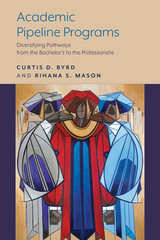
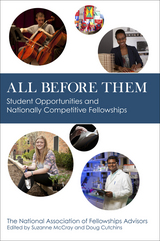
This collection of essays helps advisors by providing information about major changes in the fellowship and scholarship landscape. Included is guidance on the new Schwarzman scholarship for study in China, the recently added video interview for the Mitchell scholarship, and the new rules for the Rhodes personal statement (an advisor’s take). Additionally, seasoned advisors share practical advice, ranging from workshops that engage students and faculty to helpful technological tools to personal statements and office assessments. Keeping the focus on the scholar in the scholarship process is a central theme. All before Them is an important addition to any faculty mentor’s or scholarship advisor’s toolkit.
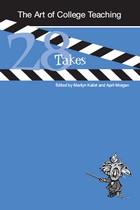
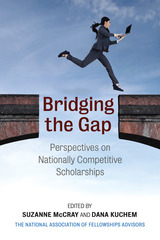
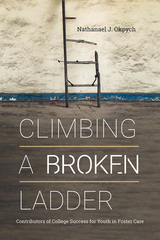
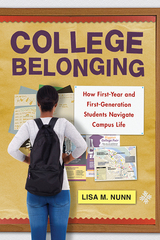

Stressed and sleepless, today's high school students race from school to activities in their most competitive game of all: admission to a top-ranked, prestigious university. But is relying on magazine rankings and a vague sense of "prestige" really the best way to choose a college? Is hiring test prep teachers and consultants really the best way to shape your own education?
In this book, edited by a veteran admissions counselor, a passionate advocate for students, the presidents and admission deans of leading colleges and universities--like Dartmouth, Vanderbilt, Harvard--remind readers that college choice and admission are a matter of fit, not of winning a prize, and that many colleges are "good" in different ways. They call for bold changes in admissions policies and application strategies, to help both colleges and applicants to rediscover what college is really for. It's not just a ticket to financial success, but a once-in-a-lifetime chance to explore new worlds of knowledge.
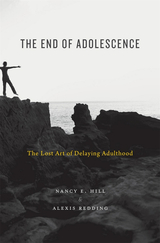
Is Gen Z resistant to growing up? A leading developmental psychologist and an expert in the college student experience debunk this stereotype and explain how we can better support young adults as they make the transition from adolescence to the rest of their lives.
Experts and the general public are convinced that young people today are trapped in an extended adolescence—coddled, unaccountable, and more reluctant to take on adult responsibilities than previous generations. Nancy Hill and Alexis Redding argue that what is perceived as stalled development is in fact typical. Those reprimanding today’s youth have forgotten that they once balked at the transition to adulthood themselves.
From an abandoned archive of recordings of college students from half a century ago, Hill and Redding discovered that there is nothing new about feeling insecure, questioning identities, and struggling to find purpose. Like many of today’s young adults, those of two generations ago also felt isolated and anxious that the path to success felt fearfully narrow. This earlier cohort, too, worried about whether they could make it on their own.
Yet, among today’s young adults, these developmentally appropriate struggles are seen as evidence of immaturity. If society adopts this jaundiced perspective, it will fail in its mission to prepare young adults for citizenship, family life, and work. Instead, Hill and Redding offer an alternative view of delaying adulthood and identify the benefits of taking additional time to construct a meaningful future. When adults set aside judgment, there is a lot they can do to ensure that young adults get the same developmental chances they had.
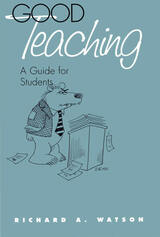
From junior college to Ivy League university, the level of teaching ranges from "great to awful," according to Richard A. Watson, who explains not only how to survive but how to profit from and enjoy your college experience.
To help students make important personal choices—what school? what major? what classes?—Watson explains such broad areas as administrative structure, institutional goals, and faculty aspirations.
Charging the student with the ultimate responsibility for learning, Watson presents certain academic facts of life: teaching is not the primary concern of either the faculty or the administration in most institutions; few professors on the university level have had any training in teaching, and even fewer started out with teaching as their goal; senior professors do not teach much (the higher the rank and salary, the less time in the classroom), and those seeking tenure must emphasize research to survive; and almost certainly, the bad teacher who is a good researcher will get paid more than the good teacher who does not publish.
This is a book about good teaching and how to find it. Rejecting the conventional wisdom that a professor devoted to research will not be effective in the classroom, Watson advises that you take classes from the professor you may have been cautioned to avoid.
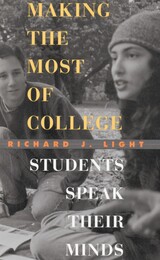
Why do some students make the most of college, while others struggle and look back on years of missed deadlines and missed opportunities? What choices can students make, and what can teachers and university leaders do, to improve more students’ experiences and help them achieve the most from their time and money? Most important, how is the increasing diversity on campus—cultural, racial, and religious—affecting education? What can students and faculty do to benefit from differences, and even learn from the inevitable moments of misunderstanding and awkwardness?
From his ten years of interviews with Harvard seniors, Richard Light distills encouraging—and surprisingly practical—answers to fundamental questions. How can you choose classes wisely? What’s the best way to study? Why do some professors inspire and others leave you cold? How can you connect what you discover in class to all you’re learning in the rest of life? Light suggests, for instance: studying in pairs or groups can be more productive than studying alone; the first and most important skill to learn is time management; supervised independent research projects and working internships offer the most learning and the greatest challenges; and encounters with students of different religions can be simultaneously the most taxing and most illuminating of all the experiences with a diverse student body.
Filled with practical advice, illuminated with stories of real students’ self-doubts, failures, discoveries, and hopes, Making the Most of College is a handbook for academic and personal success.
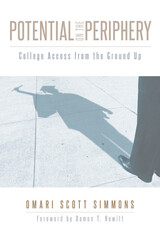
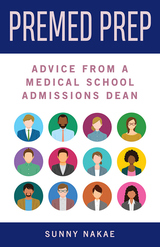
Premed Prep answers all these questions and more, with detailed case studies and insider tips that can help premed students authentically prepare and enjoy the journey from the very beginning. Sunny Nakae draws from her many years of experience as a medical school admissions dean to offer wise and compassionate advice that can help premed students of all backgrounds. She also has specific tips for students who are first-generation, minority, non-traditional, and undocumented.
Both forthright and supportive, Nakae’s advice is offered in a keep-it-real style that gives premed students a unique window into how admissions committees view and assess them. Premed Prep covers how to approach preparation with a focus on exploration and growth, and how to stop obsessing over med school application checklists. This book will do more than help you get a seat in medical school; it will start you on the process of becoming a successful future physician.
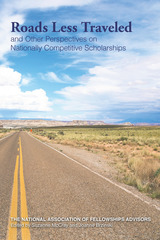
For many, the applications present an unfamiliar territory, so students seek out informed advisors who can help them navigate the terrain. This volume of essays is a great way for anyone advising students through an application to become an expert. Roads Less Traveled and Other Perspectives on Nationally Competitive Scholarships provides critical information from scholarship foundations about the best ways to guide students—from considering a career path, to completing the application, to preparing for an interview. Experienced advisors also share helpful tips on practical topics like writing letters of endorsement or assisting those who want to study abroad, and they provide programmatic advice on how to broaden the pool of applicants, address those with financial needs, and make all who apply feel the process has value beyond winning. Roads Less Traveled and Other Perspectives on Nationally Competitive Scholarships is a must for anyone advising students on scholarships.
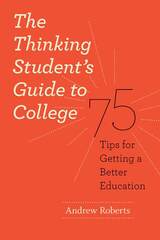
Each fall, thousands of eager freshmen descend on college and university campuses expecting the best education imaginable: inspiring classes taught by top-ranked professors, academic advisors who will guide them to a prestigious job or graduate school, and an environment where learning flourishes outside the classroom as much as it does in lecture halls. Unfortunately, most of these freshmen soon learn that academic life is not what they imagined. Classes are taught by overworked graduate students and adjuncts rather than seasoned faculty members, undergrads receive minimal attention from advisors or administrators, and potentially valuable campus resources remain outside their grasp.
Andrew Roberts’ Thinking Student’s Guide to College helps students take charge of their university experience by providing a blueprint they can follow to achieve their educational goals—whether at public or private schools, large research universities or small liberal arts colleges. An inside look penned by a professor at Northwestern University, this book offers concrete tips on choosing a college, selecting classes, deciding on a major, interacting with faculty, and applying to graduate school. Here, Roberts exposes the secrets of the ivory tower to reveal what motivates professors, where to find loopholes in university bureaucracy, and most importantly, how to get a personalized education. Based on interviews with faculty and cutting-edge educational research, The Thinking Student’s Guide to College is a necessary handbook for students striving to excel academically, creatively, and personally during their undergraduate years.
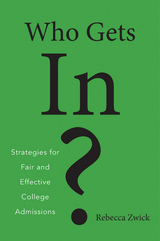
When it comes to the hotly disputed topic of college admissions, the one thing everyone agrees about is that it’s unfair. But there is little agreement on what a fair process would be.
Rebecca Zwick takes a hard look at the high-stakes competition of U.S. college admissions today. Illustrating her points using analyses of survey data from applicants to the nation’s top colleges and universities, she assesses the goals of different admissions systems and the fairness of criteria—from high school grades and standardized test scores to race, socioeconomic status, and students’ academic aspirations. The demographic makeup of the class and the educational outcomes of its students can vary substantially, depending upon how an institution approaches its task. Who Gets In? considers the merits and flaws of competing approaches and demonstrates that admissions policies can sometimes fail to produce the desired results. For example, some nontraditional selection methods can hurt more than help the students they are intended to benefit.
As Zwick shows, there is no objective way to evaluate admissions systems—no universal definition of student merit or blanket entitlement to attend college. Some schools may hope to attract well-rounded students, while others will focus on specific academic strengths. What matters most is that a school’s admissions policy reflects its particular educational philosophy. Colleges should be free to include socioeconomic and racial preferences among their admissions criteria, Zwick contends, but they should strive for transparency about the factors they use to evaluate applicants.
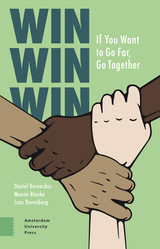
READERS
Browse our collection.
PUBLISHERS
See BiblioVault's publisher services.
STUDENT SERVICES
Files for college accessibility offices.
UChicago Accessibility Resources
home | accessibility | search | about | contact us
BiblioVault ® 2001 - 2024
The University of Chicago Press









